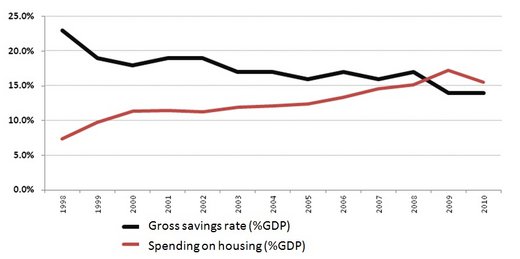Turkey has to put on the brakes because of its disorganized urban transformation
In Turkey, as spending on housing contributes more to the GDP, the domestic savings rate decreases.
Turkey is not like China. When it achieves high growth rates like China, it has to slow down to cool the engine now and then. After a couple of years of high growth, Turkey has to slow down and take a deep breath. Why? Because Turkey’s savings rate is almost one-fourth that of China’s. Turkey used to compare better in the past.
In 1980, China’s savings rate was less than 1.5 times that of Turkey, with 35 percent as a ratio of GDP to Turkey’s 25 percent. Currently, China’s savings rate exceeds 50 percent of its GDP, compared to Turkey’s 12 percent. If domestic savings do not promote the growth process, you need to close the current account deficit with the savings of other countries. You can’t drive a windmill with a pair of bellows. Therefore, you need to put on the brakes every now and then. This is a structural fact for Turkey.
And now let me give our prime minister his due. In 2012, Turkey’s growth rate will decrease to around 3 percent, almost by 70 percent compared to 2011. The growth rate will be lowered intentionally. The government, aware that the Turkey’s low rate of savings cannot carry high growth rates such as those of China and thus the high current account deficit for long, is slowing the economy down so that the risks concerning Turkey’s economy will not be magnified.
I think this is the right thing to do. Allowing what is needed to be done without fighting reality, the prime minister has taken the right step, more importantly in the current period with consecutive elections ahead. So, let this be the second point to emphasize. But why does Turkey’s domestic savings rate fail to promote the sustainable growth of the Turkish economy?
The Urbanization Strategy study carried out in cooperation with the World Bank Turkey office and TEPAV have a figure on this very issue. It shows that as spending on housing contributes more to the GDP, the domestic savings rate decreases. Since 1998, the savings / GDP ratio has increased by 50 percent while the urbanization ratio has risen, with a 140 percent increase in housing expenditures.
It is the demand not the supply that has increased. Because urban transformation in Turkey does not have a coordinated path, Turkey cannot attain high growth rates two years in a row like China does. It has to put on the brakes every now and then. Then, who is to blame for the need to slow down the economy? The Housing Development Administration of Turkey, for sure.

This commentary was published in Radikal daily on 16.10.2012




